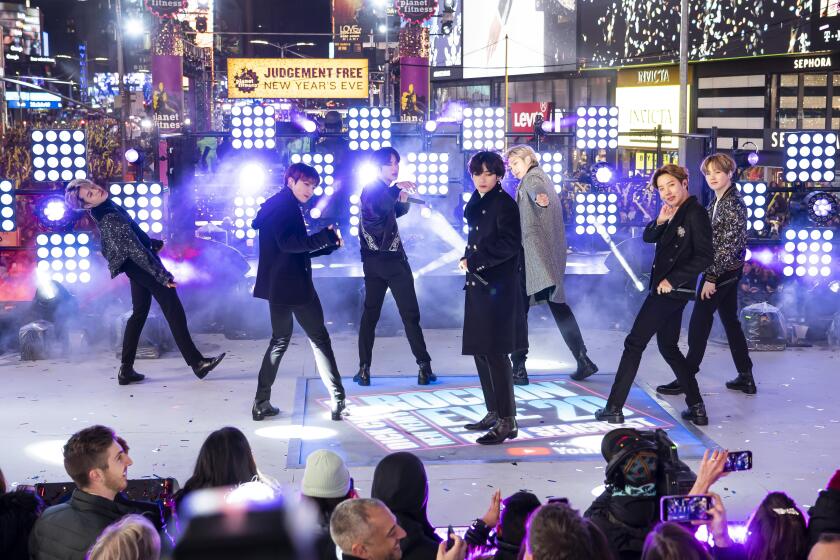Smashing Pumpkins’ Billy Corgan has a lot to say about Spotify, Courtney Love and our ‘dystopia’
- Share via
Billy Corgan is no stranger to upsetting people on the internet. But on a November morning, he seems remorseful to have upset a particular demographic: witches.
“It’s Witchgate!” he announces.
Smashing Pumpkins’ forthcoming album, “Cyr,” out Friday, is a roving 20-song double album that courses with currents of ’80s synth-pop and darkwave occultism — tailored most fittingly for the darkest days of the year. Corgan, 53, takes special care to note that he pronounces the title, named after a 4th century child saint, like “seer.” But he’s starting to second-guess his own pronunciations.
“I have the witches going after me for mispronouncing ‘Samhain’ in [the song] ‘Wyttch,’” he laments, now that he’s learned it’s pronounced “sah-wen.” He sighs. “Who knows?”

Corgan dials into the video call from the Chicago home he shares with his partner, designer Chloe Mendel, and their two young children, Augustus and Philomena. Although COVID-19 has imposed restrictions on public life, Corgan feels as energized and prolific as ever, boasting that the Pumpkins already have 46 more songs to follow “Cyr.”
“I am the Hermit,” he says, referring to the ninth card in the traditional tarot deck. “I withdraw, I study. I got the light if you want to follow me. If not? Leave me the f— alone.”
On their fifth studio album, K-pop superstars BTS hit a note that’s hard to capture today: hopefulness.
Written and produced entirely by Corgan, “Cyr” features the Smashing Pumpkins’ co-founding guitarist James Iha and drummer Jimmy Chamberlin, plus new guitarist Jeff Schroeder and touring vocalist/keyboardist Katie Cole. “I was trying to bring myself into modernity,” says Corgan of the record, an electronic detour from his more guitar-driven past. “I got [audio production program] Logic, I got some beats going, but I just wasn’t feeling it. I started to feel like the Luddite who couldn’t evolve. But then I realized that when I first heard Siouxsie and the Banshees, Sisters of Mercy and Joy Division, they were making very modern music by using the technology that they had at hand. So I had to get inside the choices that they made.”
Five songs off “Cyr” will soundtrack a five-part animated video series titled “In Ashes,” which follows a trio of friends as they survive amid a mass power outage. Corgan says he originally pitched the story to a “big shot director,” but it was never pursued further. He then took the idea to Portland, Ore., studio Deep Sky, which rendered his post-apocalyptic narrative in the comic book-style of ’90s cartoon “Æon Flux.”
“In the ’90s I played a lot with the themes of nihilism,” he says. “Now I play with dystopia. I try to get past the William Gibson cyberpunk version of dystopia [and into] more of a spiritual dystopia. Aren’t we living it now? I believe we’re in a form of spiritual war. There are times when humanity has to really wrestle for itself from a soul point of view.”
Although reticent to discuss the 2020 election, Corgan bemoans the loss of a middle ground. “I’ve taken almost no positions, and that makes me a heretic,” he says with laugh. “There’s orthodoxy, and there’s heresy. Why can’t there be a third and a fourth and the fifth choice?”

The band celebrated the 25th anniversary of their 1995 epic, “Mellon Collie and the Infinite Sadness.” With the exception of snarling alternative classics like “Zero” and “Bullet With Butterfly Wings,” the double album marked a significant departure from the straight-shooting fuzz-rock of their 1993 breakthrough LP “Siamese Dream,” and to a lesser extent, 1994’s “Pisces Iscariot.” Corgan attributes this to a “prankster” energy espoused by the band.
“A lot of the choices Smashing Pumpkins made were to piss people off,” he says.
“We had a lot of success with ‘Siamese Dream,’ but we were getting lumped in with all the other bands,” he recalls. “It was lazy 1993 journalism .... Grunge! I thought we were more in the ilk of classic rock bands, like the Beatles or Zep. It used to make people really uncomfortable when we played solos. It brought out the pranksters in us.”
The process of musical liberation so central to the making of “Mellon Collie” — or self-indulgence, depending on whom you ask — worked in tandem with Corgan’s process of deprogramming from years of abuse while living with his father and stepmother. Twenty-eight songs were culled from an initial batch of 50, and so came to be the Pumpkins’ lasting alt-rock “Odyssey.”
“I wasn’t governed by fear,” says Corgan. “I didn’t have anybody standing there saying ‘You can’t do that.’ [I thought], ‘I’m not defined by my environment. I’m going to define my environment.’”
Corgan says he’s already working on a 33-song rock opera, which will become the final installment of a trilogy that started with “Mellon Collie,” followed by the Pumpkins’ 2000 album, “Machina/The Machines of God.” A conceptual “proto-cyber-metal” album inspired by musical theater, “Machina” was the last album to feature all four founding members, including bassist D’arcy Wretzky; she departed the band in the midst of the recording process. The album slumped in sales, and Corgan later described the project as “alienating.”
“Our generation wasn’t allowed to sell perfume,” sniffs Corgan, alluding to other commercial options afforded to today’s artists. He says today’s music industry “has made a deal with the devil” with regard to streaming services.
“We have allowed third parties to come in and co-opt our [intellectual property],” he says. “What they did is they sold out the artists on the rates. And now you see the streaming companies [like Spotify] are going to reduce the rates for artists now. Just like Facebook squeezed everybody on advertising, they’re going to squeeze artists.”

Considering the unique challenges on artists posed by the COVID-19 pandemic, Corgan hopes to remain adaptable. “We’ve toyed with the idea of some kind of online concert series,” he says. “I don’t know if I want to be standing there, trying to sing a song while a guy in the corner’s coughing into his mask. I don’t know if I’m psychologically there yet.”
Smashing Pumpkins last toured in 2018, in support of their Rick Rubin-produced record of the same year, “Shiny and Oh So Bright, Vol. 1.” It was the first time Corgan had toured with Iha and Chamberlin in many years; the return of ex-bassist Wretzky, however, fell through under ambiguous circumstances. Yet of all reunions on this tour, most surprising was a Holmdel, N.J., cameo by Corgan’s former partner in love and song, Courtney Love. The two had famously feuded for years over Corgan’s contributions to songs recorded with Love’s band, Hole, some of which he claimed went uncredited.
“I think at some point you look at your life and think there’s only a few people that really matter; Courtney, and by extension Frances [Bean Cobain], matter to me,” says Corgan. “Courtney’s been living in England, and she’s very happy. I’ve said stupid stuff, she’s said stupid stuff. But we talk every once in a while, and it’s totally lucid. It’s a joy to just celebrate that. We made it through, and there’s certainly plenty of wreckage along the way … but it’s more of a family bond for us.
“Courtney once said, ‘He stopped writing hits when he stopped writing about me,’ which of course is not true,” Corgan says with a smirk. “But I like to tell people … ‘She stopped having hits when I stopped writing them!’”
More to Read
The biggest entertainment stories
Get our big stories about Hollywood, film, television, music, arts, culture and more right in your inbox as soon as they publish.
You may occasionally receive promotional content from the Los Angeles Times.












